Activist Condemns Hijab Crackdown in Tehran Metro

Political activist Abbas Abdi has slammed the recent deployment of police and hijab patrols in Tehran's metro stations, aiming to enforce mandatory hijab regulations.

Political activist Abbas Abdi has slammed the recent deployment of police and hijab patrols in Tehran's metro stations, aiming to enforce mandatory hijab regulations.
In a Monday editorial for Etemad newspaper, the reputable reformist commentator and journalist expressed deep concern over the situation, asserting that “the increased police presence in the metro only serves to heighten public discontent.”
In recent months the regime has hardened its stance over the hijab as the strength of rebellion fails to weaken.
Abdi emphasized that the onus is on the government to align itself with the expectations of the people and work towards a more harmonious coexistence. Images circulating on social media depict numerous hijab officers creating congestion in a subway passageway at Tehran's Enghelab station, now colloquially referred to as the "horror tunnel" for women.
Reports also highlight the use of cameras by the Security Police (FARAJA) to identify women without headscarves. Abdi reposted an image of the hijab enforcers on the X social network on Friday, cautioning that the regime would likely face regrettable consequences for its decisions.
The stringent enforcement of hijab rules gained momentum following the tragic death of Iranian-Kurdish woman Mahsa Amini in hijab police custody in September 2022, igniting the Women, Life, Freedom protests. In May, Tehran Mayor Alireza Zakani announced the implementation of a uniformed security unit to prevent women from accessing metro ticket gates.
Reports in August suggested that Tehran municipality was planning to deploy 400 personnel to enforce hijab laws at subway stations in the capital. The heightened presence of hijab police also led to the death of Armita Geravand, 16, who lost her life in October following an encounter with Tehran's hijab police in the subway, in echoes of the Mahsa Amini tragedy one year earlier.

Iran’s foreign ministry on Monday denied Israeli claims that Tehran was involved in the seizure of a British-owned and Japanese-operated cargo ship in the Red Sea by Yemen's Houthis.
"We have said multiple times that resistance groups in the region act independently and spontaneously based on their interests and that of their people," foreign ministry's spokesman Naser Kanaani said at a press briefing. He added that Israeli claims were aimed at diverting attention away from Israeli's "irreparable defeat" in its battle against Hamas militants in the Gaza Strip.
The Israeli Prime Minister's Office issued a statement after the hijacking, calling it "an act of Iranian terrorism that expresses a leap in their aggression", asserting that "no Israelis were present on the ship and the ship is owned by a British company operated by a Japanese company."
"This is another Iranian act of terrorism that represents an escalation in Iran's belligerence against the citizens of the free world, with concomitant international ramifications vis-a-vis the security of global shipping routes."
The alleged Houthi attack comes after calls by Iran’s leader Ali Khamenei to ban shipment of oil and food to Israel. His call was repeated by his ultra-hardliner loyalists such as Hossein Shariatmadari, who runs the Kayhan Daily newspaper in Tehran.
The hijacked ship is Galaxy Leader, registered under a British company, which is partially owned by Israeli tycoon Abraham Ungar who goes by Rami. He is the founder of Ray Shipping Ltd., and is known as one of the richest men in Israel. The vessel was leased out to a Japanese company at the time of the hijacking.
The Houthis, an ally of Tehran, have been launching long-range missile and drone salvoes at Israel in solidarity with the Palestinian Hamas militants fighting in Gaza.
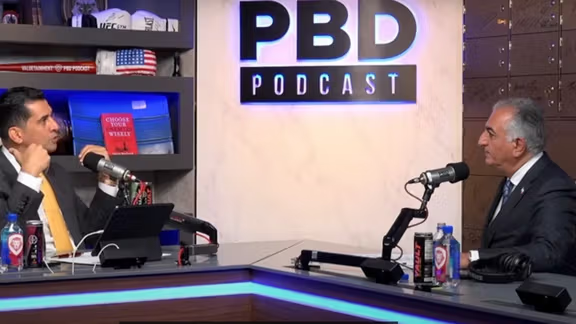
Iran’s exiled prince Reza Pahlavi has revealed that his father Mohammad-Reza planned to pass the throne to him just before the monarchy fell in the 1979 revolution.
In a three-hour interview with entrepreneur and best-selling author Patrick Bet-David -- himself of Iranian Assyrian and Armenian origin -- Pahlavi said when his father, the last shah of Iran, knew about his cancer he wanted his son to succeed to the throne but his aspiration was eclipsed by the emergence of a leftist-religious revolution that altered the course of Iran’s history.
The former crown prince, who has long campaigned for a secular and democratic Iran rather than a restoration of the monarchy, has a large fan base in Iran and abroad. During the Women, Life, Freedom protests – ignited by the death in custody of 22-year-old Mahsa Amini in September 2022 -- Pahlavi became a leading opposition figure, but he has critics among other dissident activists who do not see him as the leader of the opposition.
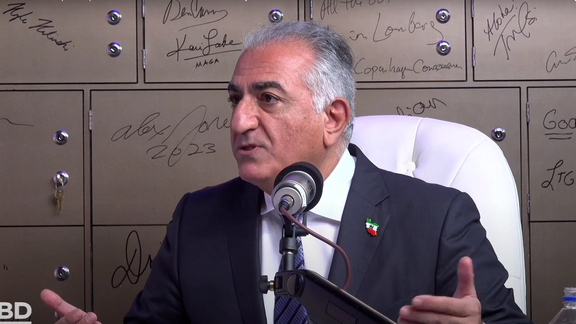
Despite at least four decades of Islamic Republic propaganda to indoctrinate Iranian children and youth against the Pahlavis, Iran’s last dynasty is still revered among Iranians, who chant slogans to honor the two Pahlavi kings who reigned in the 20th century during gatherings and rallies. Reza Pahlavi enjoys support thanks to his hereditary gift, among middle aged and older Iranians, but also he is popular among the Mahsa Generation Z youth, who see him touring the world to make the voices of Iranians heard and talking about transitioning from the Islamic Republic.
Asked about if he would consider running for a position in Iran after the collapse of the Islamic Republic regime, Pahlavi emphasized that the Iranian people are the ones who should decide on the future form of the government. “In order for people to be empowered, they have to have more than hope. They have to actually believe that it can be done. I believe that it can be done.”
He argued that most Iranians share Western values and the Islamic Republic is the obstacle on Iran’s path to connect to the global community. “We (Iranians) are your allies in principle” as a democracy seeking country. He asserted, “how many democracies do you know that go to war against one another?” He argued that Iran after the Islamic Republic is a country that the world can count on as a flagbearer of peace rather than an instigator of conflicts.
Questioned by Bet-David about how he sees the colossal challenge of overthrowing clerical rule, Pahlavi said, “There was a time I didn’t think that I would possibly see the fall of the Berlin Wall in my lifetime.”
The interview was the first time Pahlavi defended some of the policies of his father, tacitly trying to vindicate the last monarch and his notorious intelligence agency SAVAK. The secret police, domestic security and intelligence service, operated from 1957 until prime minister Shapour Bakhtiar ordered its dissolution during the climax of the 1979 Iranian Revolution. Pahlavi argued that many of the prisoners held by SAVAK were among thousands of Soviet KGB agents active in Iran. He charged that Iran’s current ruler Ali Khamenei was among such prisoners who had undergone training under KGB in Palestinian camp in Lebanon.
Pahlavi also talked about how the US government at the time helped the Islamic revolutionaries topple his father while Bet-David showed a video of a debate in which former US President Ronald Reagan criticized Jimmy Carter for undercutting Mohammad-Reza Shah Pahlavi. The prince also talked about his meeting with Carter and his National Security Advisor Zbigniew Brzezinski in 1978 at the White House. According to Pahlavi, the US politicians believed the establishment of an Islamic government in Tehran can stop the spread of Communism in the region.
Asked about why Iranians revolted against his father, he said the country was progressing toward a modern era “too fast,” explaining that the advances were rejected by the clergy who were conservative about any change in the social structure of Iran. “All of a sudden you find a country, where the income per capita jumps to the level it was, and people’s purchasing power made them capable of having so much more... and then you have the resistance coming from the clergy who never liked where my father was taking the country.”
Now Iranians have the lowest purchasing power unprecedented in history while women and minorities are persecuted,and Iran is far from the goals of Iran’s monarchs who believed the country would take its place among the top five countries of the world.
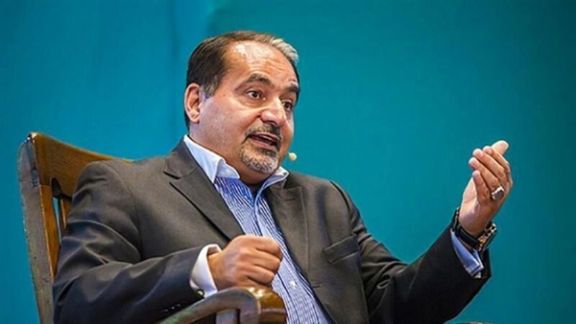
A House Committee has initiated an inquiry into the role of Hossein Mousavian at Princeton University, suspecting him of advancing Iran's interests.
The House Committee of Education and the Workforce is probing the Pro-Tehran pundit who served as a key figure in Iran’s nuclear negotiations with the international community until 2005. He is currently a Middle East Security and Nuclear Policy Specialist at the Program on Science and Global Security at Princeton.
Twelve Republican committee members have expressed concerns about Mousavian's influence on campus, citing his participation in Qassem Soleimani's funeral and an appearance on Iranian TV. Mousavian denies the allegations.
The investigation aims to assess potential threats to national security and underscores broader worries about malign influences infiltrating US education.
Representative Virginia Foxx has emphasized the 15-year tenure of Mousavian at Princeton as a troubling instance of individuals associated with hostile regimes within US education.
Notably, the revelation that STRATCOM hosted Mousavian as a speaker in August 2023 has raised concerns among House Committee members and the Armed Services Committees. Mousavian clarified that his talk at STRATCOM focused on peace in the Middle East.
Despite a recent declassified US intelligence report asserting that Iran is not currently engaged in key nuclear weapons activities, European reports from 2023 suggest the presence of an active atomic weapons program. Princeton University has yet to respond to inquiries regarding the investigation.
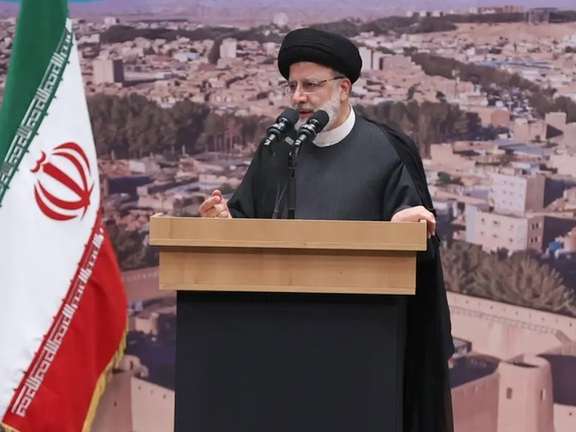
In a rare recognition of the country the regime has until now refused to name, Iranian President Ebrahim Raisi has once again called for a swift end to Israel.
He said Sunday,"I hope that God will liberate Palestine as soon as possible, and we witness the final moments of Israel's existence and celebrate its end."
The Iranian regime has consistently called for Israel's destruction, and until now, refused to call it anything other than 'the Zionist entity'. Demonizing the world's only Jewish state has long been a justification for Iran's substantial financial and military support to militant groups like Hamas in Gaza which waged war on Israel on October 7, murdering at least 1,200 mostly civilians and taking another 240 into Gaza.
So strong is the mission since the establishment of the Islamic Republic that while the Iranian economy is on its knees, the regime continues to fund hundreds of millions of dollars each year into its proxies across the region.
In spite of funding the group at least $100m a year and supporting it with military and technical aid, Reuters reported on Wednesday that the Iranian regime was unaware of Hamas' October 7 terror attack against Israel. The report quoted three anonymous senior officials as stating that in a recent meeting in Tehran, Khamenei told Hamas leader Ismail Haniyeh: “You gave us no warning of your Oct. 7 attack on Israel and we will not enter the war on your behalf.”
Hamas later denied the claims backed up by the fact that there had been months of top level meetings between the regime, Hamas and Lebanese Hezbollah in the months leading up to the war.
On Sunday, the supreme leader also called on Muslim nations to hamper Israel economically as the calls for Israel's end continue unabated.
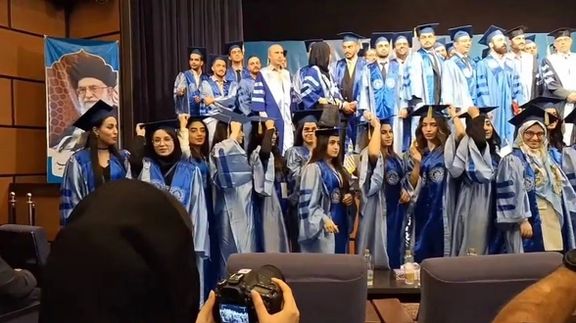
The chancellor of a university on Iran's Kish Island has reportedly resigned following a graduation ceremony where female students appeared without head-coverings, defying hijab rules.
Photos and videos published on social media showed the majority of girls at a small graduation ceremony on Kish Island's international campus of Sharif University of Technology wearing graduation hats with their hair flowing over their shoulders instead of covered with headscarves.
In a publicly released letter to the university's board of trustees on Saturday, Ali Selk-Ghaffari, the university's chancellor, offered his resignation. He referred to the girls' action as "outside [accepted] norms" and expressed regret that some alumnae had not complied with "academic regulations and dignity."
Kish Island, off the southern coast of Iran in the Persian Gulf with a population of around 40,000, is a free trade zone and a very popular destination of tourists. The international campus of Sharif University of Technology, one of Iran's most prestigious universities, has around 900 students.
The girls' bold defiance of compulsory hijab has angered pro-establishment media and social media users, leading to criticism of authorities for perceived lapses in enforcing hijab rules.
In a statement on Saturday, the public relations department of Sharif University of Technology reported that the chancellor and educational deputy of the university refused to stay in the ceremony until the end and left the venue due to observed violations of hijab rules during the awards ceremony.
In its statement, the university apologized to the “esteemed families of martyrs, veterans and all who are devoted to the Islamic Republic” and vowed to take serious and immediate action against those who defied the rules as well as others whose carelessness caused the incident.
Graduation ceremony without hijab is disdaining the existence of the Islamic Republic! From the south to the north of the country, from the east to the west, progressive students have taken sleep from the eyes of the [regime] criminals, oppressors and bullies!,”Daneshjooyan-e Pishro (Progressive Students), a loose network of dissident students which has been active in various universities since 2019, tweeted about the incident.
Other student groups have also welcomed Sharif University’s defiance of hijab at their graduation ceremony. A student newsletter run by dissident students at Tehran’s Amirkabir University of Technology called their move “civil disobedience”.
Since Mahsa Amini’s death in custody after being arrested for what morality police considered as “unfitting hijab” in September last year which sparked several months of protests across the country, particularly in universities, defiance of hijab has hugely grown in the Islamic Republic.
In recent months authorities have adopted a strict initiative to enforce the hijab rules at any cost including measures such as impounding cars if passengers defy the hijab rules, shutting down businesses such as cafes, restaurants, and shopping malls, and banned hijab-defiant celebrities from acting in films.
In October authorities revoked the medical license of a female surgeon in Amol in northern Iran after she appeared at a public awards ceremony on Doctors Day without wearing the hijab. Dr Fatemeh Rajayi-Rad was forced to appear in full hijab on state media and apologize for causing offense.
In another instance, the CEO of a prominent pharmaceutical company, Haleh Hamedifard, who had a headscarf on, was denied entry to the health ministry to attend a meeting with the officials because hijab enforcers stationed at the ministry said the tunic she had worn over trousers was too short.